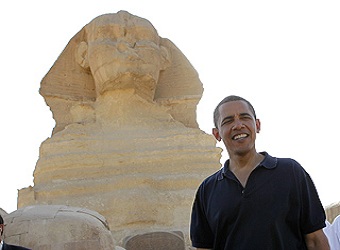The White House briefing room has always been a bit of a zoo, but on Tuesday afternoon it became official.
In response to the first question of the day, about Egypt, White House press secretary Jay Carney made a surprise announcement. “There is an elephant in the room here,” he said.
How the animal eluded the Secret Service and found its way into the already cramped briefing room is a mystery, but this much we know: This elephant came from North Africa as a result of the military overthrow last week of Egypt’s democratically elected president.
By any reasonable definition, the toppling of Mohamed Morsi was a coup. But Washington can’t call it a coup because U.S. law would then require cutting off all aid to Egypt, which the administration doesn’t want to do. Hence, the pachyderm on the podium.
“We have not made a determination about what to call or label the events in Egypt that led to the change in government there,” Carney declared. In fact, he said, “we will take the time necessary as we review our legal obligations and as we consult with Congress when it comes to this issue of designating and labeling the events that took place.”
As they use this coup review to stall for time, U.S. officials are throwing their full linguistic arsenal at the problem, producing all manner of euphemism to portray the putsch.
President Obama calls it “this uncertain period” and part of a “transition to democracy.”
Carney describes it as “this transitional period” and “an incredibly complex and difficult situation.”
State Department spokeswoman Jen Psaki identifies the coup as “a very fluid situation.”
House Speaker John Boehner, asked whether he considered the events to be a coup, replied, “I think the situation in Egypt is a tenuous one.”
Of course, officials can call the overthrow a ham sandwich, and that won’t make it any less of a coup. But, as a legal matter, it makes sense to deny the coup.
Section 508 of the Foreign Assistance Actsays unequivocally that there can be no aid “to any country whose duly elected head of government is deposed by military coup or decree.” Morsi was duly elected, so his ouster pretty much requires the United States to cut off $1.5 billion in foreign aid. But Morsi governed as an Islamist thug — and the administration doesn’t want to punish the Egyptian military for doing the good deed of removing him from power.
There are a couple of problems with this lexicographic trick. The ambiguity makes U.S. policy seem weak; Obama’s ambivalence toward events in Egypt the past few years — Morsi was elected after events that also might be described as a coup — has left parties on all sides suspicious of the United States. At the same time, Obama’s cute evasion of foreign-aid requirements, following his administration’s decision to postpone implementation of a key part of health-care reform, gives the impression that he views the law like a buffet from which he can pick and choose.
Outside the administration, there is pressure to acknowledge the obvious.
“It was a coup,” said Sen. John McCain (R-Ariz.).
“When the military takes over and they depose an elected government,” said Sen. Rand Paul (R-Ky.), “that’s the definition of a military coup.”
Said the Woodrow Wilson Center’s Robin Wright on “Meet the Press”: “A coup is a coup is a coup is a coup.”
Except when it’s not.
State’s Psaki, fielding the coup-or-not-a-coup question Monday, explained that “we factor lots of factors in. . . . These determinations take time.”
Carney argued that “this is a complex situation and it is not in our interests to move unnecessarily quickly in making a determination like that.”
“It seemed pretty clear,” pointed out Steve Holland of Reuters. “The army moved in; Morsi moved out.”
“This is a complex and difficult issue,” Carney repeated. “I’m being very blunt that there is not a simple or easy answer,” he added later.
On Monday and Tuesday, Carney alternately referred to the Unlabeled Happenings in Cairo as “an extremely polarized situation,” a “volatile and difficult situation,” a “very challenging situation,” a “very fraught situation” and, simply, “the situation in Egypt.”
How long can the euphemisms endure? Egypt’s interim government said Tuesday that it hopes to hold elections in six months — at which time Egypt would again be a democracy eligible for foreign aid. It’s theoretically possible the Obama administration could hold out for that long without naming the Situation in Egypt — but that would be quite a coup.
About the Writer:
Dana Milbank writes about political theater in the nation’s capital. He joined The Post as a political reporter in 2000, after two years as a senior editor of The New Republic and eight years with the Wall Street Journal. He is also the author of three political books: Tears of a Clown (2010), Homo Politicus (2008) and Smashmouth (2001). He lives in Washington.
Source: The Washington Post



